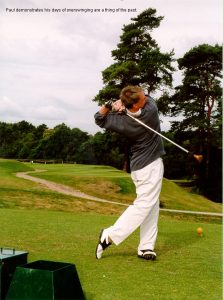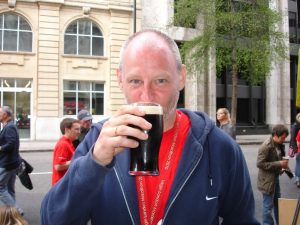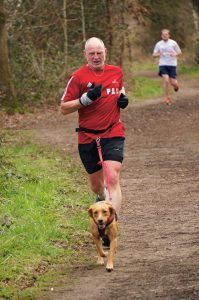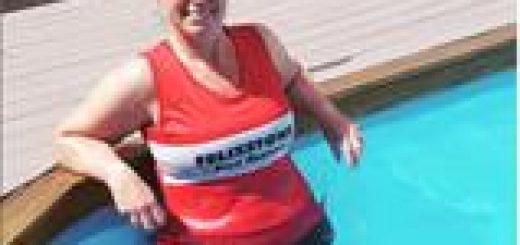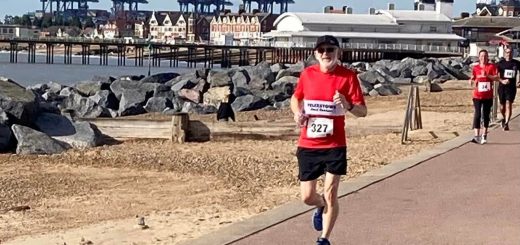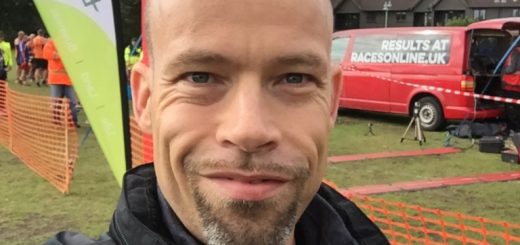Runner Profile: ‘Slow’ Paul Schwer
What is your earliest running memory?
I grew up at Felixstowe Ferry Golf Club, where my father was the club professional, and I attended the old village school in Ferry Road as an infant. I must have been five years old when the school’s sports day was held one year. My Dad couldn’t afford to have an assistant pro so it was rare for him to turn up at anything during the working day, but on this occasion he did and I remember being so pleased he was there.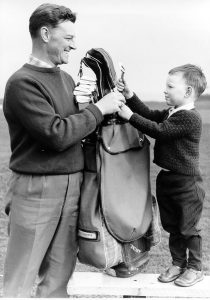
Towards the end of the afternoon, the fathers and sons wheelbarrow race was announced. Dad whispered to me, “Just hang on, son”, grabbed my legs somewhere near the top of my thighs and set off at a flat stick gallop as soon as the gun went off. All the other kids were plodding along, one hand in front of the other with their fathers holding their ankles, but I couldn’t even touch the ground. I was terrified and with good reason. With the finish line just a few yards away, the silly old sod tripped over and I ploughed an elegant furrow with my chin into the grass of the school playing field. Through my tears, I could make out the other kids gradually plodding past me on the way to the line, while Dad was blaming me for trying to reach the ground and causing him to over-balance.
I played golf for the next forty years.
So, what made you return to running?
I was a half decent golfer, playing off a single figure handicap for years, winning the FFGC Club Championship a couple of times and the Suffolk Amateur Foursomes title with my brother Chris one year. Golf is often thought of (unfairly) as an old man’s game and it is true that many sporty people take it up when they are unable to do more energetic sports later in life. In my case, it was the exact opposite.
I started struggling with the ‘yips’. For those of you who have never heard of this affliction, it is a psychological problem that affects sportsmen. Eric Bristow the darts player had it. He took longer and longer to be able to release a dart. Cricketers have suffered from it, where a bowler can’t release the ball as he comes in to bowl. Many golfers’ careers have come to a premature end because of the yips, usually when using a putter, such as Peter Allis, the BBC’s famous golf commentator. In my case, I battled against it for several years before finally deciding I had to give up the game I loved, not because I couldn’t play it to the standard I wanted to any more, but because it was so embarrassing and stressful to be so bad at it.
But why running and not something else?
When I met and married Mrs Slow, I was already a golfer and the pattern of playing with friends on Saturday afternoons and in competitions on Sundays was well set. Giving up golf opened up horrendous visions of me having to do the garden or wash my car or do my fair share of the housework at weekends. I needed something that was going to be at least as time-consuming as golf. I wrote to Lord’s offering my services as a Test cricketer, thinking most games usually last at least three or four days, but they politely turned me down. (They spelt it with a ‘Ph’ instead of the usual ‘F’ but they got ‘off’ right.) I had no choice. I plucked up some courage and told Mrs Slow I was going to become a runner. The surgeon was brilliant and you can hardly see the scars today from where she split her sides.
When and what was your first race?
My Dad died in 2006 (the police are still looking for a small child with a long memory) and I decided I would run the Felixstowe Half Marathon the following year in his memory and raise money for St Elizabeth’s Hospice. I’d given up smoking in the mid-90s and over the following ten years, I ate and drank too much until I was the size of a small family car. I enjoyed the training and the weight reduction and clocked what I thought was a respectable 1h:44m:45s in the race. I remember running past the duck pond for the second time, desperately out of breath and listening to some cocky sod chatting up a female runner immediately in front of me. I realised I might not be as bad as I thought, when she and I emerged at the top of the hill and her erstwhile suitor was nowhere to be seen.
However, I am clearly not a natural runner and recurring injuries have been a fact of life for me ever since. The following year saw me slipping back into old unhealthy habits. I kept meaning to start running again, once I had lost some weight, but we all know what thought did. My business was badly affected by the credit crunch and demanded more and more of my time. By 2009 I weighed over sixteen stone and Suffolk Coastal wrote and asked me to avoid weak bridges and not to use their park benches, when I was out and about.
That was until the August of that year. Friends of ours were staying with us at our place in France and he wanted to start running with a view to being able to do a 5K by the time he turned fifty. I went out with him for a gentle bimble around the village and realised just what I had been missing. The answer was to start running again and lose the weight, not the other way around. As soon as I got back to the house, I told Mrs Slow I was going to run the London Marathon the following April. The French paramedics were amazing and, with several yards of high quality catgut, a team of surgeons from Toulouse were able to make a bloody good job of putting her back together yet again.
Was marathon running love at first sight?
No, absolutely not. I trained hard for London, but didn’t really know what I was doing. I couldn’t understand why you did long runs that weren’t as far as the race itself and you were supposed to do them so much slower than race pace. As a result, I was probably exhausted before I even started. I ran for another hospice charity in memory of my father (because the charity specialising in rehabilitating traumatised children whose faces have been used as seed drilling equipment didn’t have any places left) and everything was fine for the first sixteen miles. Then I hit ‘the wall’. I’d heard about this but nothing had prepared me for the physical and mental collapse that followed. I remember wandering along by the side of the road in the Isle of Dogs, crying my eyes out, telling my Dad I was sorry, whilst constantly being buffeted by hundreds of other runners streaming past me.
Eventually, I managed to get myself restarted and gradually the remaining miles were reeled in. Then came my ‘road to Damascus’ moment (caused by missing the correct turning somewhere near Holborn, I think). I was in the long tunnel that comes out on the Embankment and as I ran up the slope into the daylight, the noise of thousands of people cheering crashed over me from all sides and above from the bridge parapet. I had my name on my shirt and everyone seemed to be calling it out. It was the closest an ordinary guy like me would ever get to running out onto the pitch at Wembley or White Hart Lane and I loved it and treasure that moment to this day.
I ran 4:16:48 eventually but was desperately disappointed with my time, having hoped to do at least sub-4:00, if not around 3:45. As soon as I finished, I knew I couldn’t let it rest there. Within a week I had signed up for the Dublin Marathon six months later.
Where did the “Slow” nickname come from?
That was inspired by someone at London. I was going along nicely for the first half of the race and I kept hearing people cheering on ‘Big Steve’ somewhere behind me. Eventually, as I ran out of oompf, this guy came up alongside me. I cranked my neck up to a near impossible angle, squinted skywards and asked him, “Why do they call you Big Steve?” He was huge and obviously Ben’s twin. I decided I liked the support he attracted but ‘Average-sized, Middle-aged, Balding Old Paul’ wouldn’t fit on the shirt, so ‘Slow’ was born.
In the Dublin Marathon, I had Slow Paul on my shirt for the first time. About the middle of the race I found myself with some space around me just as I came to the top of a rise with a right-hand turn. There was a lovely Irish girl marshalling there on the corner, who called out, “You’re not Slow Paul. You’re feckin’ Fast Paul”. I’ve worn the name ever since, but she hasn’t managed to find me again yet.
Dublin was wonderful but ultimately frustrating. I had kept close tabs on the 4:00 hour pacing guys and was trundling alongside them quite happily when we hit the 25 mile marker and they said, if you want to break four hours, go now. I put the hammer down (why I was carrying it in the first place, I have no idea) but nothing happened. I couldn’t believe it. The harder I tried to run, the slower I went.
The last mile and a quarter seemed to take forever but, in reality, it took about twelve and a half minutes and I clocked 4h:00m:59s. Doh! I had failed to break four hours again, this time by less than a minute. I had to do another one and entered the Rome Marathon for the following Spring. The die was cast. I was a marathoner.
How many marathons have you run now and which has been your favourite?
I’m averaging nearly three a year since 2010. Without wishing to tempt Providence, by the time you read this I will have just run Dublin, which is number 21. In fact, except the short-lived Dig Deep Suffolk Intro Ultra, which I ran both years it was held as a training/recovery run, Dublin is the first marathon I have done twice. I have run in some of the most beautiful and spectacular cities in the world, including Paris, Rome, Istanbul, Vienna, New York, Marrakech, Reykjavik, Berlin and Bungay. Each was unique and memorable in its own way; a few I’ve run well; others not so good but still wonderful to look back on, even if they were horrible at the time.
Marrakech will always rank highly. Not only was it my PB race (thanks for asking… 3h:37m:19s actually), but the city itself was just the most exhilaratingly ‘different’ place I had been to. I went back a year later and ran the half marathon with Jayne ‘Baby Slow’ Burman and recommend it as a midwinter weekend break to anyone.
One particularly fond memory was a couple of years ago, running a big negative split in the Black Forest Marathon in Germany, beating a guy twenty years my junior in a sprint finish to the line, with loads of my German family and friends cheering me on. That was special.
When did you join FRR?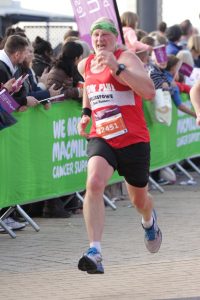
Like most newbies, I was very wary of joining a running club and making myself look foolish in front of lots of ‘proper’ runners. I simply didn’t realise at the time that looking foolish is actually a membership requirement! Even after I joined, it was a couple of years before I started turning up on a Tuesday evening. In fact, to my eternal embarrassment, I won the Most Improved Runner of the Year award in 2012 without most members having a clue who I was.
I actually got to know several of the diehards at Ipswich parkrun, which I started doing from its inception and eventually plucked up the courage to come along one evening. It changed my life and I just want to put on record, what an amazing, lovely, supportive and mentally-unhinged group of people you all are. It’s a privilege and a pleasure to run for the club.
What’s your funniest running story?
In the first month of Ipswich parkrun at Chantry back in 2012, when the runners numbered a few dozen rather than hundreds, I had a great ‘race’ to the finish against a guy who was about my age and pace. I beat him by a couple of yards, clocking about 21:30 for the 5k, and chatted with him afterwards. (When you come out on top of a head-to-head smackdown, NEVER let your victim slink away to lick his wounds. He needs to be told about his defeat in infinite detail first). He said he ran London most years and I asked him which charity he supported, only to be informed he qualified as Good For Age. Really, I asked? Yes, he replied, I am over seventy. Sometimes, victors slink.
[Ed: This was Ipswich parkrun #4 and the opponent was John Wheatley. He never recovered from such defeat and couldn’t better the time he achieved that day. He went on to help set up Colchester Castle parkrun instead where rumour has it that people named ‘Slow’ are banned.]
Oh, nothing really funny then?
Well, there was a training-related incident one Saturday morning before parkrun with my foam roller. I had got used to rolling my calves, hamstrings and glutes on the roller but this particular day, I had sore quads so used the roller on the front of my legs for the first time, with unfortunate results. “Bollocks”, I screamed. “We’re up here”, came a squeaky reply from behind my ears. I posted this story on Facebook at the time and, when I turned up at parkrun, Sally Solomon called across from one side of the packed Pavilion to the other, “How are your balls, Paul?” I can’t understand how rumours get around so quickly.
You spend ten to twelve weeks a year in France. What’s the running like there?
Where we live in the Aveyron, it is very hilly and wooded. There is a forest just a mile or so away, the other side of the village, with miles of trails where I can run with the dogs without a lead (although they still insist I wear it when I cross a road). It’s not unusual to flush out wild boar on an early morning run. The scenery is just spectacular and I love being there.
The races tend to be trail races by definition, because of the terrain and they would fit Robin Harper’s definition of a Tin Pot Classic to a ‘T’. They don’t just run them on footpaths and farmers’ tracks, but up and down near vertical hillsides, pulling on bushes and even ropes at the steepest points, edging around cliffs with bits of red and white plastic tape guarding against sheer drops to the valley floor below, streams, rocky and uneven ground; they’ve got the lot. The marshalling is superb, the water stations have cake and dark chocolate, there is usually a meal at the end, which inevitably tends to run to three courses including wine and the average cost is around €15 for a 16-24km race. They are great fun. I’m going to organise an FRR raid on one of them one day, so a gang of you can come over and see for yourselves. Watch this space.
What’s next?
What an insensitive question! Don’t you realise I am still recovering from my annual rejection letter from the grizzle-haired old scrote, who goes out of his way each year to block my return to the scene of my first ever marathon and palms me off with some tatty running top instead? If I had run London well back in 2010, I would probably have never run another marathon, but that’s not the point. It owes me and I want to go back and do myself justice.
Virtually every city in the world now hosts a marathon (and they‘re all fast and flat, of course), so I’m spoiled for choice. I would love to qualify for the Boston Marathon, which is tantalizingly close with a Good For Age threshold of sub-3h:40m:00s. If I had run two minutes faster in the Iceland Marathon in Reykjavik, I would have qualified for Boston the year of the bombing which, given my usual race pace, could have seen me on the finishing straight when the bomb went off. It makes it seem all the more important to me to be able to be there and run it one day. If I did do Boston, I would probably then try and complete the set of six Marathon Majors by running Chicago and Tokyo.
I am very mindful that we all do this sport with a finite running lifespan. Injury and illness can strike at any time and it wouldn’t take much to bring my running odyssey to an abrupt halt. It makes me so grateful that I fell into this sport by accident and fell in love with it, and the people who do it, shortly afterwards.
I was never particularly good at cricket anyway.
Who’s your nomination for the next FRR Runner Profile?
Hmm, tricky. There are so many interesting characters in our club, whose stories I’d love to read. However, I cannot resist the temptation to choose David Seymour to follow me, as he hopefully had to do all the way around Dublin!
Slow Paul.

